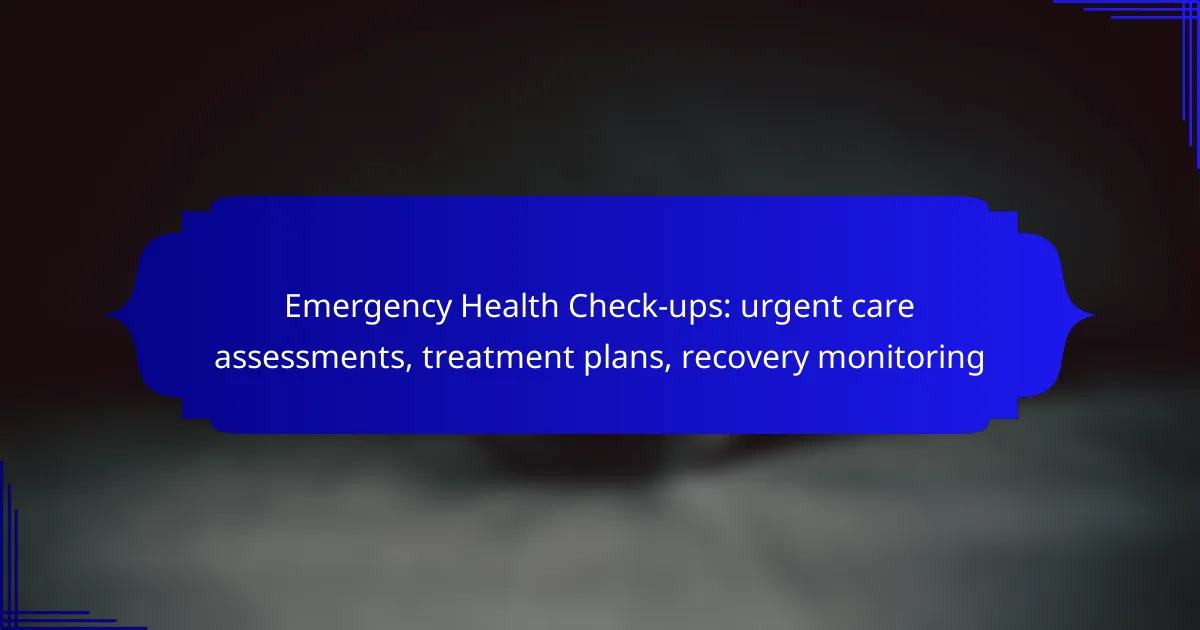Emergency health check-ups are essential for addressing urgent medical issues quickly and effectively. These services, including urgent care clinics and telehealth options, offer prompt assessments, tailored treatment plans, and ongoing recovery monitoring to ensure patients receive the care they need when it matters most.
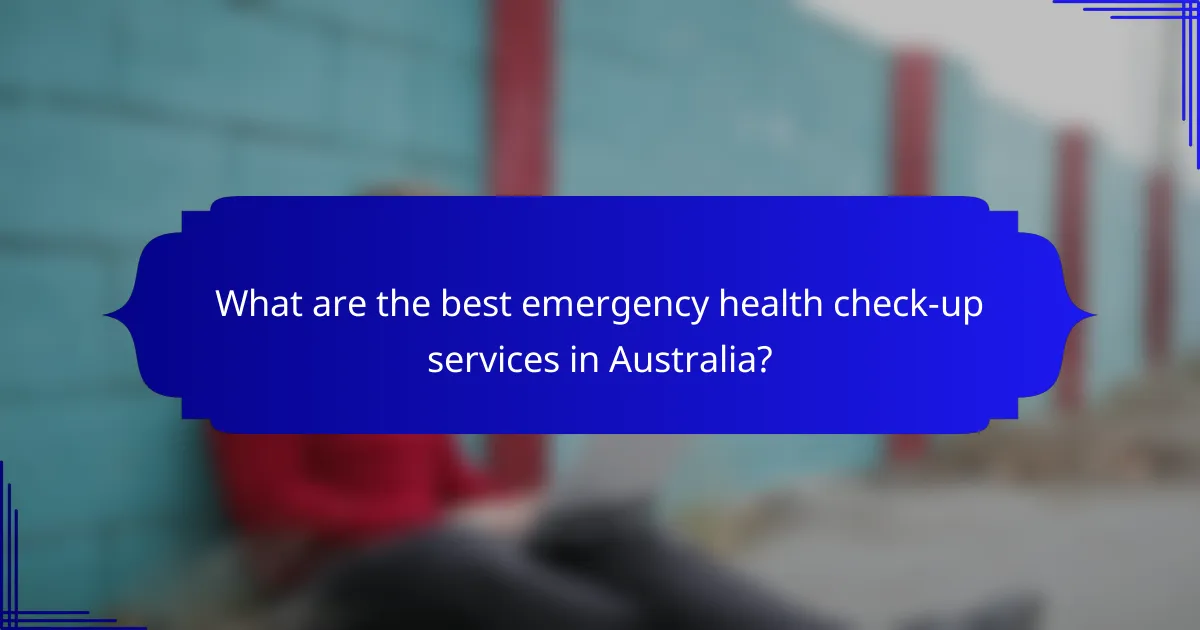
What are the best emergency health check-up services in Australia?
The best emergency health check-up services in Australia include urgent care clinics, telehealth services, and local hospitals. These options provide quick access to assessments, treatment plans, and recovery monitoring for urgent health issues.
Urgent care clinics
Urgent care clinics offer immediate medical attention for non-life-threatening conditions that require prompt treatment. They are typically open outside of regular office hours, making them a convenient option for patients who need care quickly.
When visiting an urgent care clinic, expect to receive a thorough assessment and treatment plan, often without the long wait times associated with emergency rooms. Common services include wound care, minor fractures, and infections.
Telehealth services
Telehealth services provide remote consultations with healthcare professionals, allowing patients to receive care from the comfort of their homes. This option is particularly useful for those who may have difficulty traveling or prefer not to visit a clinic in person.
During a telehealth appointment, patients can discuss symptoms, receive advice, and obtain prescriptions if necessary. Many telehealth platforms are available in Australia, often covered by health insurance, making it an accessible choice for urgent health needs.
Local hospitals
Local hospitals are equipped to handle more serious medical emergencies and provide comprehensive care. They have specialized staff and facilities for a wide range of health issues, ensuring that patients receive appropriate treatment.
For emergencies, it’s crucial to know the nearest hospital and its capabilities. While hospitals can provide extensive care, they may involve longer wait times compared to urgent care clinics, especially for non-critical cases.
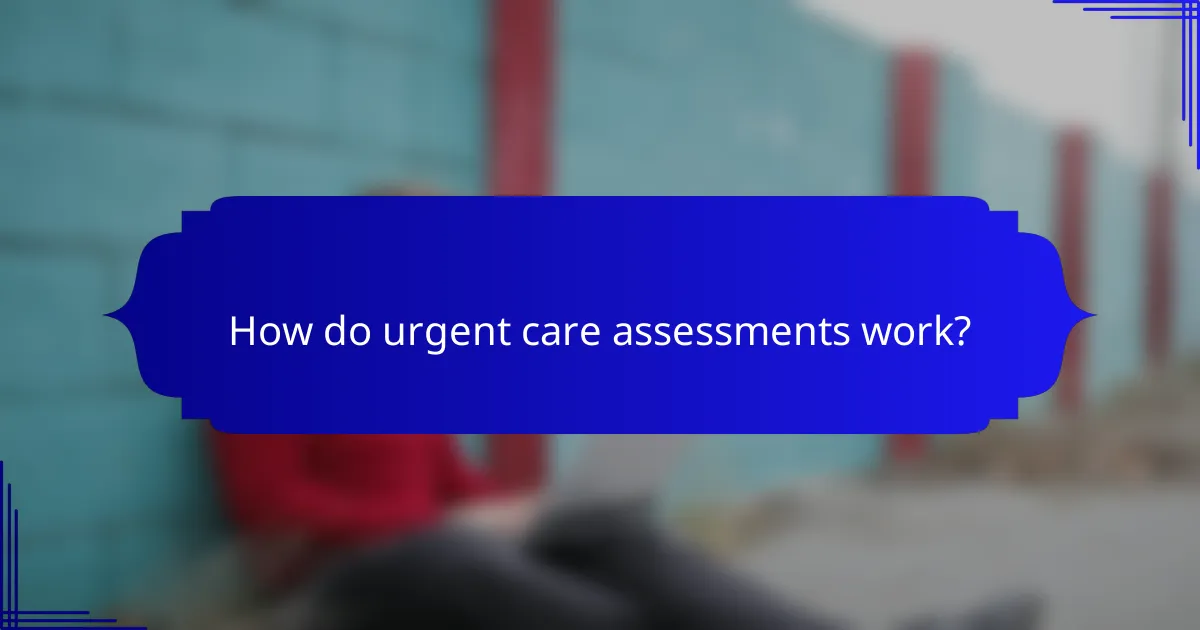
How do urgent care assessments work?
Urgent care assessments are designed to quickly evaluate a patient’s condition and determine the necessary treatment. These assessments typically involve a series of evaluations, tests, and monitoring to ensure effective and timely care.
Initial patient evaluation
The initial patient evaluation is the first step in an urgent care assessment. During this phase, healthcare providers gather essential information about the patient’s medical history, current symptoms, and any medications they are taking. This helps in forming a preliminary understanding of the patient’s health status.
Providers often use a structured approach, asking specific questions about the onset of symptoms, severity, and any relevant past medical issues. This information is crucial for determining the urgency of the situation and guiding further assessments.
Diagnostic tests
Diagnostic tests are performed to confirm or rule out potential health issues identified during the initial evaluation. Common tests include blood tests, X-rays, and urine tests, which can provide valuable insights into the patient’s condition. The choice of tests depends on the symptoms presented and the healthcare provider’s clinical judgment.
In urgent care settings, these tests are typically conducted on-site, allowing for rapid results. Quick turnaround times are essential, as they inform treatment decisions and help prioritize care for patients with more severe conditions.
Assessment of vital signs
Assessment of vital signs is a critical component of urgent care assessments. Vital signs include heart rate, blood pressure, respiratory rate, and temperature, which provide essential information about the patient’s overall health. Monitoring these signs helps identify any immediate threats to health, such as shock or respiratory distress.
Healthcare providers will typically check vital signs upon arrival and may repeat these assessments throughout the visit to track any changes. Consistent monitoring ensures that any deterioration in the patient’s condition is promptly addressed, facilitating timely interventions.
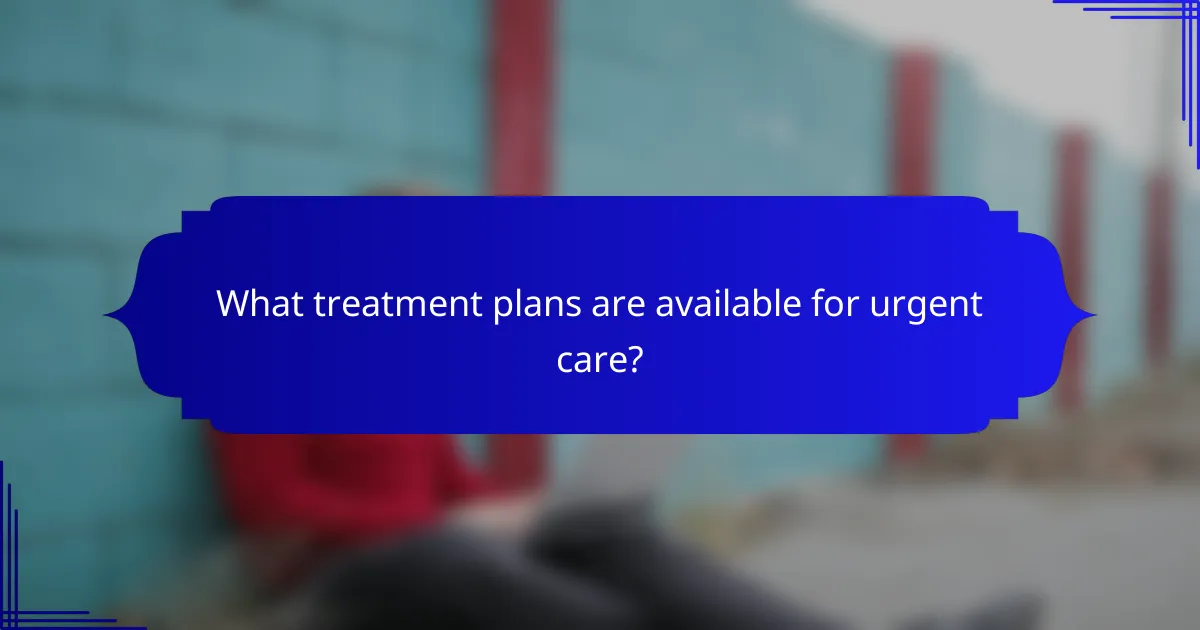
What treatment plans are available for urgent care?
Urgent care treatment plans typically include a combination of medication prescriptions, follow-up appointments, and referrals to specialists. These plans are designed to address immediate health concerns while ensuring ongoing care and support for recovery.
Medication prescriptions
Medication prescriptions are often a key component of urgent care treatment plans. Depending on the diagnosis, healthcare providers may prescribe antibiotics for infections, pain relievers for injuries, or other necessary medications. It’s crucial to follow the prescribed dosage and duration to ensure effective treatment.
Patients should be aware of potential side effects and interactions with other medications. Always communicate with your healthcare provider about any existing prescriptions or allergies to avoid complications.
Follow-up appointments
Follow-up appointments are essential to monitor recovery and assess the effectiveness of the treatment plan. These visits allow healthcare providers to make necessary adjustments to medications or therapies based on the patient’s progress. Typically, follow-ups are scheduled within a few days to a couple of weeks after the initial urgent care visit.
Patients should keep track of their symptoms and any changes in their condition to discuss during these appointments. Consistent communication with healthcare providers can lead to better health outcomes.
Referral to specialists
If an urgent care assessment reveals a more complex health issue, a referral to specialists may be necessary. Specialists can provide targeted treatment and management for specific conditions, such as orthopedic issues or chronic illnesses. This step ensures that patients receive the most appropriate care tailored to their needs.
When receiving a referral, patients should inquire about the specialist’s experience and the expected timeline for appointments. It’s also advisable to check with insurance providers regarding coverage for specialist visits to avoid unexpected costs.
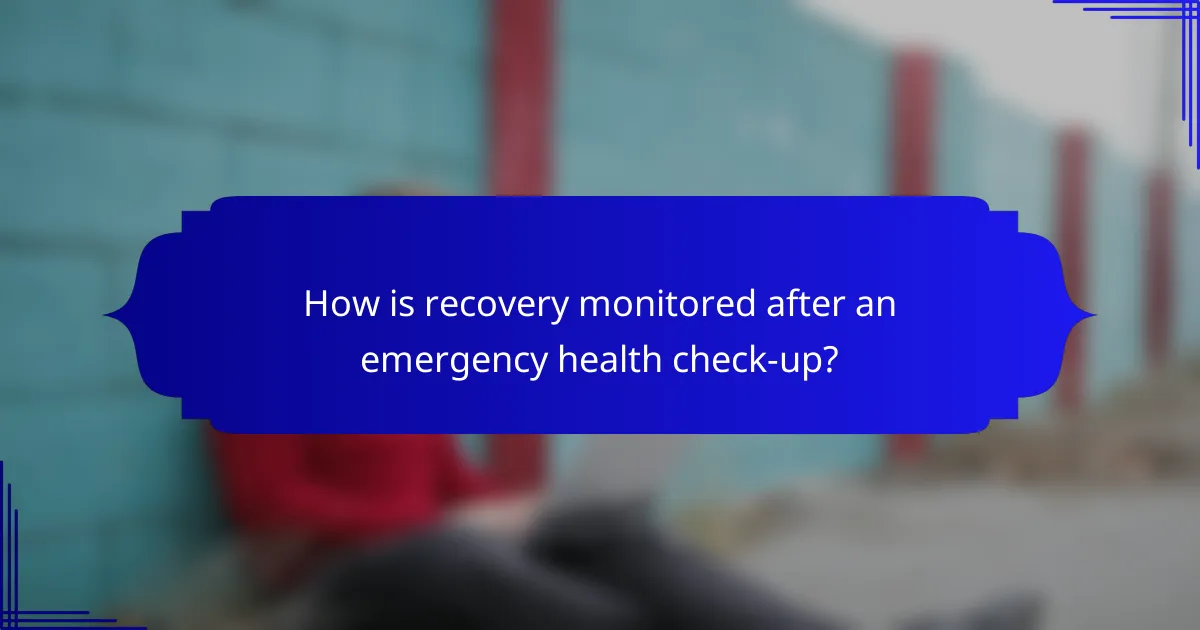
How is recovery monitored after an emergency health check-up?
Recovery after an emergency health check-up is monitored through a combination of follow-up calls, patient self-monitoring, and the use of health tracking applications. These methods ensure that patients are progressing well and any complications are addressed promptly.
Regular follow-up calls
Regular follow-up calls are a key component in monitoring recovery. Healthcare providers typically reach out to patients within a few days after the check-up to assess their condition and discuss any ongoing symptoms or concerns.
During these calls, providers may ask specific questions about the patient’s recovery, medication adherence, and any side effects experienced. This proactive approach helps identify potential issues early, allowing for timely interventions.
Patient self-monitoring guidelines
Patients are encouraged to follow self-monitoring guidelines to track their recovery effectively. This may include keeping a daily log of symptoms, medication schedules, and any changes in their health status.
Common guidelines often recommend checking vital signs, such as temperature and pulse, and noting any unusual symptoms. Patients should be aware of warning signs that require immediate medical attention, such as increased pain or difficulty breathing.
Use of health tracking apps
Health tracking apps can significantly enhance recovery monitoring by providing a platform for patients to log their health data. Many apps allow users to track symptoms, medications, and even communicate directly with healthcare providers.
These applications often include reminders for medication and appointments, making it easier for patients to adhere to their treatment plans. Some popular apps also offer features for sharing data with healthcare professionals, facilitating better-informed decisions about ongoing care.
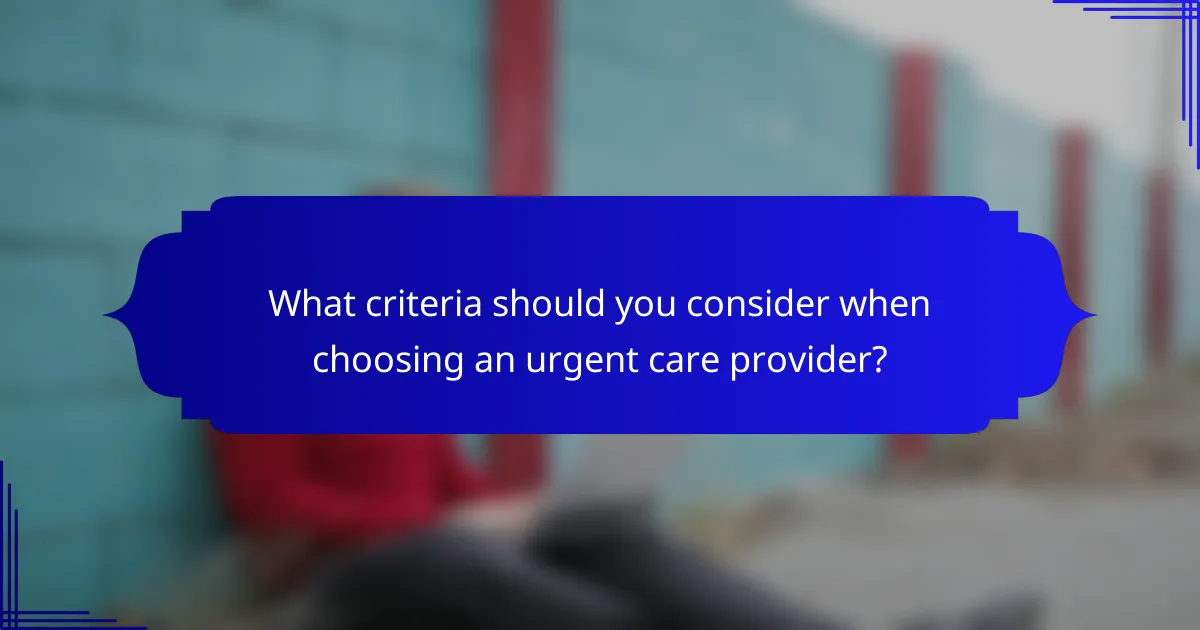
What criteria should you consider when choosing an urgent care provider?
When selecting an urgent care provider, consider factors such as location accessibility, insurance acceptance, and patient reviews. These criteria help ensure you receive timely, affordable, and quality care when needed.
Location accessibility
Location accessibility is crucial when choosing an urgent care provider. Look for facilities that are conveniently located near your home or workplace to minimize travel time, especially during emergencies. A good rule of thumb is to find a provider within a 10 to 15-minute drive.
Check the operating hours as well; many urgent care centers offer extended hours, including evenings and weekends, which can be beneficial for unexpected health issues. Ensure the location has adequate parking or public transport options to facilitate easy access.
Insurance acceptance
Insurance acceptance is a key factor in determining the overall cost of your urgent care visit. Verify that the provider accepts your health insurance plan to avoid unexpected out-of-pocket expenses. Many urgent care centers display their accepted insurance plans on their websites.
If you are uninsured, inquire about self-pay options and any available discounts. Some facilities offer transparent pricing or payment plans that can help manage costs effectively.
Patient reviews
Patient reviews provide valuable insights into the quality of care at an urgent care facility. Look for feedback on aspects such as wait times, staff professionalism, and the effectiveness of treatment. Websites like Google Reviews or Healthgrades can be useful for gathering this information.
Consider both the quantity and quality of reviews. A facility with a high number of positive reviews is generally a good sign, while consistent complaints about similar issues may indicate potential problems. Aim for a provider with a solid reputation in your community.

What are the costs associated with emergency health check-ups in Australia?
The costs of emergency health check-ups in Australia can vary significantly based on the type of service and location. Generally, patients can expect to pay anywhere from AUD 100 to AUD 300 for urgent care assessments, depending on the complexity of the treatment required.
Average consultation fees
Average consultation fees for emergency health check-ups typically range from AUD 100 to AUD 250. This fee often includes an initial assessment and basic treatment, but additional costs may arise for tests or specialized care.
In urban areas, prices may be on the higher end of this spectrum, while rural clinics might offer lower rates. It’s advisable to check with local providers for specific pricing and any out-of-pocket expenses that may apply.
Many health insurance plans cover a portion of these costs, so reviewing your policy can help determine your financial responsibility. Always inquire about potential fees before receiving treatment to avoid unexpected charges.
